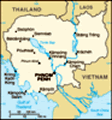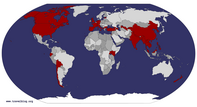Advertisement
Kampong Phluk, a.k.a. the "stilted village," has turned into a popular alternative local activity from the temples of Angkor, situated only about an hour from Siem Reap. Despite this, it soon became apparent our young guide had never been out that way before, a fact he doesn’t tell us until we get there and he appears completely befuddled and out of his depth, prompting me to broach the issue. We'd arranged for him to pick us up late-afternoon from our hotel hoping that by the time we got down there the heat and tourists of the day would have died down somewhat.
After slowing down for a quick inspection we're waived past the official ticket booth and a kilometre or so further on down the muddy road we pulled up next to a collection of moored boats, boatmen and their agents. Having passed the official ticket booth the money we paid would go straight to the source, so to speak, of whatever that was, though this certainly didn't guarantee we'd be charged the going rate. Twenty dollars each multiplied by four seemed excessive in the extreme, so I offered for that price we'd rather walk, and set off

 waiting...
waiting...
Kampong Phluktowards the village. This then became $50 all in, for which price the guy insisted, we could have our very own boat... whatever that meant, seeing as we were the only tourists stood astride a dozen boats.
It was about then a coach load of Korean tourists pulled up and started piling into a boat. This event forced my hand for a number of reasons. Seeing how many could be crammed into a boat led me to quickly appreciate the profit margins which could be made from a boatload of tourists. Furthermore, our children developed a sudden desire to join with the Korean tour group -- no doubt as a direct result of comparable tour groups having liberally showered our kids with chocolate, candies, pencils, pens, stickers and all manner of treats every time our paths had crossed up in the temples the last few days. Easy to understand then was our children's reaction when now seeing what were affectively, in their eyes, bands of marauding Asian Christmas elves.
These events, enjoyed by all concerned, were particularly humorous when Mandalay attempted to speak to them in Chinese or when Kiva was asked where he

 waiting...
waiting...
Kampong Phlukwas from and he'd reply "Seoul, Korea". They couldn't quite work out whether he was confused by the question or taking the piss.
Regardless, the idea of beating the tour group into the village had now suddenly shot to the top of my priority list.
The journey then rather hurriedly commenced along a muddy caramel colored canal, painfully low on water, being the height of the dry season. We puttered towards the stilted wooden houses lining the banks of the waterway, extending out to the edge of Tonle Sap Lake. Their design and improbable height testifying to the significant annual changes in the lake's water levels here.
For the most part Tonle Sap 'aka' Great Lake, is not the largest freshwater lake in S/E Asia. Then in summer, snow melt from the Himalayas and heavy regional monsoonal rains combine to swell the mighty Mekong River to such an extent the lake can no longer drain into it - in fact, so great is the volume that the Tonle Sap's outlet rivers' flow is reversed, backing up enormous quantities of water into the Great Lake, increasing its area fivefold, and its depth
from an average of one to nine metres.
Inhabiting the banks of this lake and the surrounding fertile farmland are mostly Vietnamese and Muslim Cham people. Kampong Phluk then is relatively atypical in that it is almost exclusively Khmer. Not that the casual visitor would know the difference anyway. In fact, the casual visitor could be forgiven for thinking this 'floating village' was inhabited almost entirely by children who lined our route, some in boats, some on the muddy bank, waving and smiling as we chugged on by. Though as gleeful as they appeared to be to see us, especially upon sighting our own kids, they were clearly more interested in the fuller boat chugging along behind us.
In preparation for their arrival many of the kids sported outstretched arms, one folded over the other in the Gangnam Style, horse-trot dance pose, confirmed with a little jig of the wrists and a hop from side-to-side.
My attention now switched to what is going on behind us as it appears the Korean tourists are tossing stuff into the water for the kids to leap in and retrieve it. This act in itself
is not unusual. However, exactly what they are throwing is a first for me.
Our boat driver is attempting to stay ahead of their faster boat on the narrow waterway, so we are effectively blocking their progress. Under the circumstances I indicate for him to let them past so we can proceed at our own pace and more importantly, I can take a better look at exactly what’s going on.
It is then I see it. The Korean tourists are gleefully flinging
Ramen noodle packets into the brown wash to delight at the half-naked kids diving off boats in droves, to frantically compete in the salvage of their prize. Ramen noodles are practically the Korean national dish, and the fact some of the kids are performing the dance moves to Korean national icon extraordinaire Psy's international mega hit, Gangnam Style, just makes the Ramen fly more liberally. (Anthropological overload!)
Oppan Gangnam Style.
Korean pop, or K-pop, is a truly globalized music phenomenon; deriving elements from myriad musical genres - then performed with a decidedly Asian flavor. Dances are choreographed to be easily remembered and repeated so that the fans can be

 Ramen Noodles
Ramen Noodles
Kampong Phluk'in the music'.
K-pop's major breakthrough in the Western mainstream media occurred with the release of
Psy's "
Gangnam Style" which to date has racked up over 2 billion views on
YouTube, notwithstanding the fact that everyone in China has also seen the video and we don't even have YouTube! If you're reading this blog it would mean you are connected to our contemporary global age of cultural technology and are well aware of this song.
I'd be fascinated to trace the evolution of this tradition here in Kampong Phluk. At this stage it would be probable to trace the first child to perform the horse trot. How familiar were they with the song and in particular its origin, and that of the origin of tourists who float through the village every day? How it then spread like wildfire amongst the other children, a catalyst in itself to learn the dance moves in order to elicit maximum attention and ultimately maximum reward from passing tourists. And what of the influence and opinions of local adults and parents and the technological means of disseminating this global cultural phenomenon to the children?
I don't doubt

 Gangnam Style
Gangnam Style
Kampong Phlukthey'll be performing this dance years from now, at least until the next cultural phenomenon sweeps across the globe giving its early adopters in this village the competitive edge. Of course it is entirely possible they've been performing K-pop for years here and we're just late to the party. What is without question is that Siem Reap has, and continues to be, heavily dominated and influenced by the influx of Korean tourists. Every time we are in town we dine on a disproportionate amount of Korean food, having acquired the taste for it after our years spent in the country.
As a western tourist reading this, I appreciate that you are disturbed. This is not the idea of the authentic village experience you signed up for. But as you can see, the Korean tourists and the Khmer villagers are really dancing to a different tune, a tune tracing its musical inspirations from electro, disco, rock, R&B and hip-hop - musical genres which themselves claim diverse origins and evolutions. A tune that has now come back full circle to influence the global music scene, where it circulates, percolates and glocalizes the world-over from New York nightclubs to Cambodian
stilted villages.
Regardless, this story has a final twist. As we reached the lake proper we are greeted by dozens of women in smaller paddle boats competing for custom to take tourists into a collection of trees partially submerged in the water aka "the floating forest". Then we are dropped off at one of the many floating restaurants at the entrance to the lake, which are affectively floating pontoons furnished with a rudimentary kitchens and a collection of tables and chairs.
We aren't asked which restaurant we'd prefer as the boat captain doubtless gets a kick-back for dropping you off at a particular pontoon, so this is the very definition of a captive market. As we board, our captain joins a table of other captains and is immediately given a cold Angkor beer. I take a photo of this congregation, and for my troubles am given a beer and asked to join them.
At Jennifer's table they get stuck into the menu which lists an array of not too dissimilar dishes with symmetrically standard prices; $4 for a small dish, $8 for a large. A small fortune in this
part of the world. When the meal eventually arrives it is apparent its major component is Ramen Noodles. This appears to be a coincidence too far, so exploiting my good standing at the captain's table of beer drinkers I wander into the kitchen area and see the Ramen noodles, stacked high. The
Korean Ramen noodles, that is.
Advertisement
Tot: 0.103s; Tpl: 0.014s; cc: 16; qc: 31; dbt: 0.0397s; 1; m:domysql w:travelblog (10.17.0.13); sld: 1;
; mem: 1.2mb



























A Small Swede in the Big World
Per-Olof Persson
Tourism...
...will always influence a community, regardless of where the tourism originates from. It was very interesting to read your honest observations, I look forward to reading more. =)